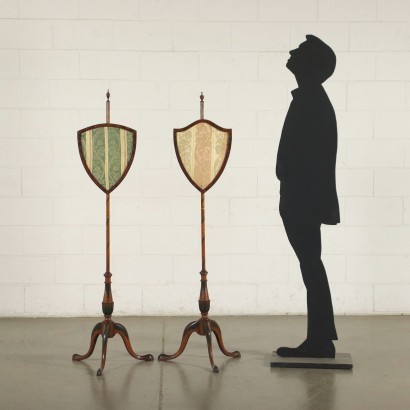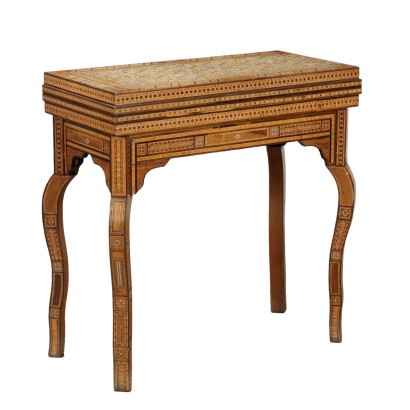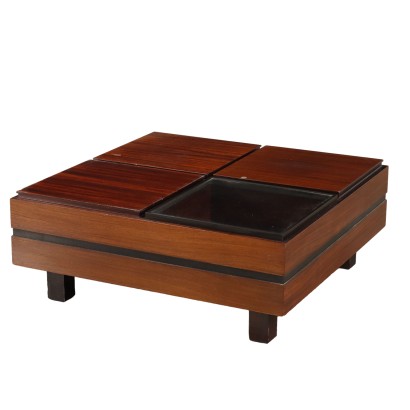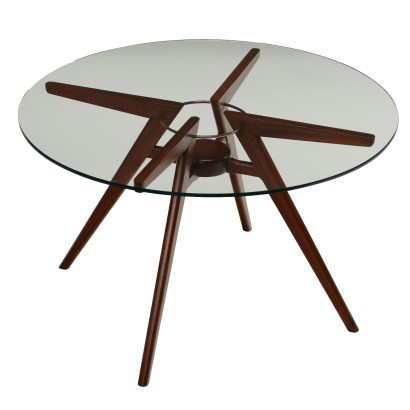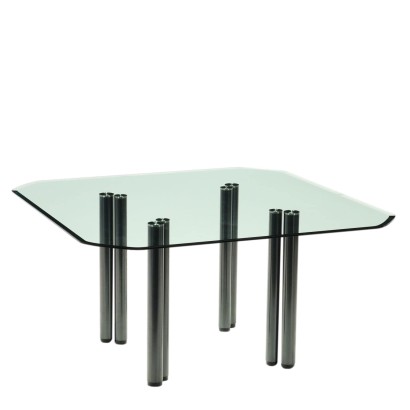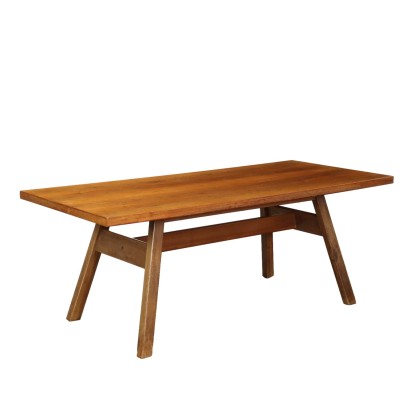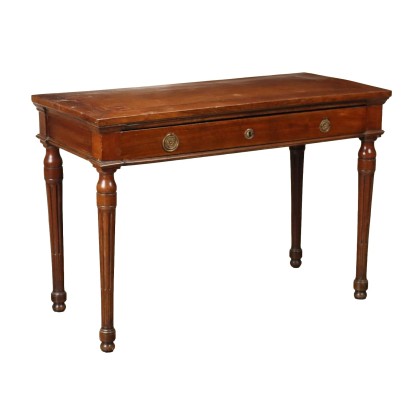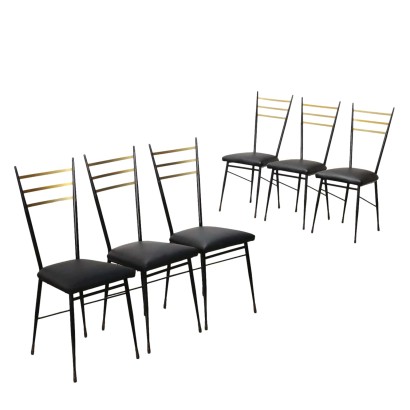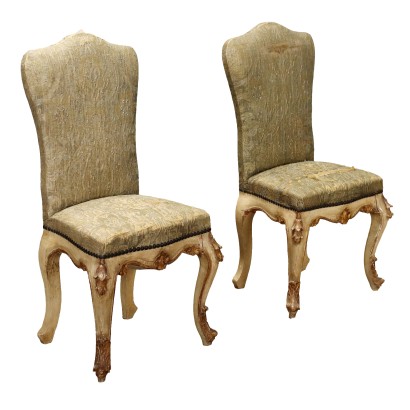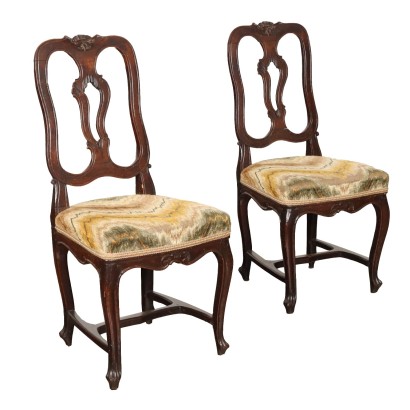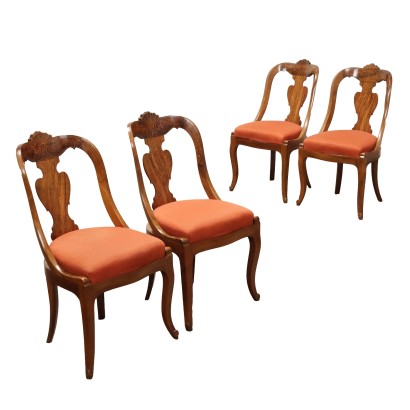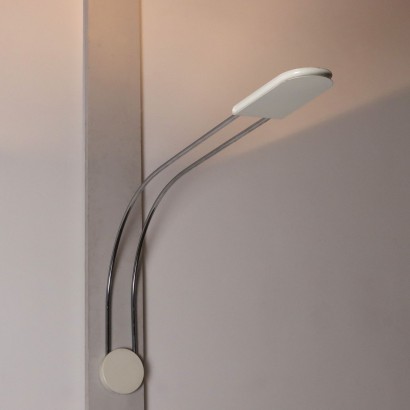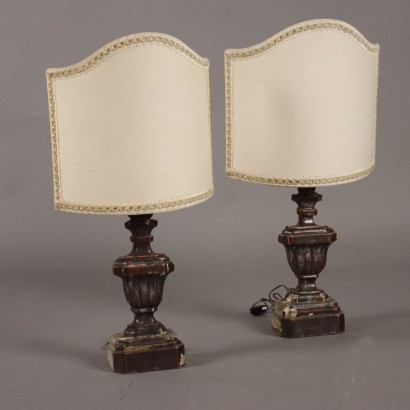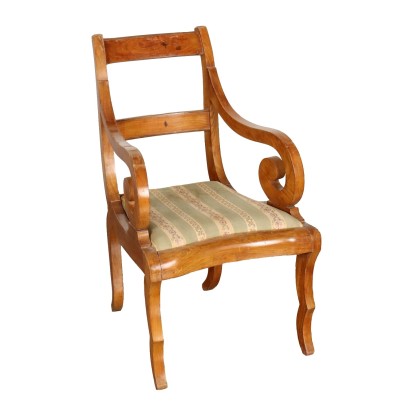Pair of George IV Screen Poles Satinwood Fabric England 19th Century
Features
Style: George IV (1760-1830)
Age: 19th Century / 1801 - 1900
Origin: England
Main essence: Satinwood
Material: Cloth
Description
Two George IV screen poles, supported by 3 curved legs, on which stands a refined baluster engaged with the pole that ends in a vase-shaped element. Two shield-shaped panels are fixed by rings and screws, so that their height can be adjusted. Made of citronnier, painted with phytomorphic motifs, the screens have embroidered fabric inserts. While in the 19th century pole screens had an ornamental function, in the 18th century they were used to shield the face from the direct heat of the fire, which could generate dangerous toxic reactions with white lead cosmetics (basic lead carbonate), widely used at the time by both men and women. The adjustable height allowed them to be customised according to the needs of the user, positioning them as a screen between their face and the fireplace.
Product Condition:
The item shows signs of wear due to age. Any damage or loss is displayed as completely as possible in the pictures. It may require restoration and recovery of french polish.
Dimensions (cm):
Height: 148
Width: 46,5
Depth: 40
Maximum size (cm):
Height: 149
Certificate issued by: Enrico Sala
Additional Information
Style: George IV (1760-1830)
It is part of the so-called "Georgian" period.This term designates the stylistic activity that took place in England between 1714 and 1830 and included the reigns of George I, George II, George III and George IV.
It is characterized, at its beginnings, by an attitude of reaction to the Baroque.
Precise characteristics and distinctions of this style are not clearly identifiable in the furniture created in England in the eighteenth century.
In the first half of this century, cabinet-making and the products of the various categories of English applied art were affected by the continuous changes in taste and manifested, in the diversity of trends and influences, the uncertainty of a precise stylistic orientation.
In the second half of the eighteenth century, the sensitivity and exceptional ingenuity of four strong personalities, destined to guide the English taste and customs of the time, intervened in the second half of the eighteenth century: Th. Chippendale, R. Adam, G. Hepplewhite and Th. Sheraton.
Find out more with our insights:
FineArt: Tallboy George II, England c.1730
FineArt: Pair of Irish Mirrors, in George III Style, second half of the 19th century
Age: 19th Century / 1801 - 1900
19th Century / 1801 - 1900Main essence: Satinwood
The name is common in France for citrus limonum , the fruit tree of the lemon. From this plant a light, solid and fragrant wood is obtained, used in the construction of furniture especially in England and France, where it was appreciated for its resistance.Material: Cloth
Other customers have searched:
Tavolini, tavolino antico..
Approfondimenti
Se ti interessano tavoli, tavolini, tavoli a vela, scrivanie, scrittoi e consolle dai un'occhiata ai nostri approfondimenti sul blog...
L'antiquariato dalla A alla Z: il Dizionario dell'Antiquariato
Il dizionario dell'antiquariato - Lastronatura
Il dizionario dell'antiquariato - Mascherone
Il dizionario dell'antiquariato - Natura morta
Il dizionario dell'antiquariato - Opificio
Il dizionario dell'antiquariato - Pastiglia
Il dizionario dell'antiquariato - Savonarola
Il dizionario dell'antiquariato - Rosone
Intaglio barocco con motivo a ricciolo
Sui tavoli:
Il Neobarocco in un grande tavolo dell'800
Il Tavolo a fratino
Sui tavolini:
Breve storia dei tavolini
Un tavolino impero lombardo: segno di egemonia politica
Il tavolino da gioco, questo sconosciuto
Il dizionario dell'antiquariato – tavolino a Commesso
...e alle presentazioni su FineArt
Tavoli antichi:
Tavolo campionario lapideo, Roma, Opificio Raffaelli
Tavolo a vela, attribuibile a Luigi e Angiolo Falcini
Tavolo attribuibile a Luigi e Angiolo Falcini
Gueridon, Regno delle Due Sicilie, primo quarto XIX secolo
Tavoli modernariato e design:
Archivio Borsani, patrimonio di memorie e saperi
Tavolo anni '40 ABV
Tavolo Mario Vender Anni '60
Tavolo anni '50 ABV
Tavolo '522' Gianfranco Frattini per Bernini
Tavolo 'Barium' Luciano Frigerio
Tavolo anni '50, Manifattura Italiana
Tavolini antichi:
Coppia di tavolini Tomaso Buzzi, attribuiti
Tavolino da gioco, Bottega Giuseppe Maggiolini, inizi XIX secolo
Tavolini modernariato:
Tavolino anni '50
Tavolino anni '40 ABV
Approfondimenti
Se ti interessano tavoli, tavolini, tavoli a vela, scrivanie, scrittoi e consolle dai un'occhiata ai nostri approfondimenti sul blog...L'antiquariato dalla A alla Z: il Dizionario dell'Antiquariato
Il dizionario dell'antiquariato - Lastronatura
Il dizionario dell'antiquariato - Mascherone
Il dizionario dell'antiquariato - Natura morta
Il dizionario dell'antiquariato - Opificio
Il dizionario dell'antiquariato - Pastiglia
Il dizionario dell'antiquariato - Savonarola
Il dizionario dell'antiquariato - Rosone
Intaglio barocco con motivo a ricciolo
Sui tavoli:
Il Neobarocco in un grande tavolo dell'800
Il Tavolo a fratino
Sui tavolini:
Breve storia dei tavolini
Un tavolino impero lombardo: segno di egemonia politica
Il tavolino da gioco, questo sconosciuto
Il dizionario dell'antiquariato – tavolino a Commesso
...e alle presentazioni su FineArt
Tavoli antichi:
Tavolo campionario lapideo, Roma, Opificio Raffaelli
Tavolo a vela, attribuibile a Luigi e Angiolo Falcini
Tavolo attribuibile a Luigi e Angiolo Falcini
Gueridon, Regno delle Due Sicilie, primo quarto XIX secolo
Tavoli modernariato e design:
Archivio Borsani, patrimonio di memorie e saperi
Tavolo anni '40 ABV
Tavolo Mario Vender Anni '60
Tavolo anni '50 ABV
Tavolo '522' Gianfranco Frattini per Bernini
Tavolo 'Barium' Luciano Frigerio
Tavolo anni '50, Manifattura Italiana
Tavolini antichi:
Coppia di tavolini Tomaso Buzzi, attribuiti
Tavolino da gioco, Bottega Giuseppe Maggiolini, inizi XIX secolo
Tavolini modernariato:
Tavolino anni '50
Tavolino anni '40 ABV
Product availability
The product can be seen at Cambiago
Immediate availability
Ready for delivery within 2 working days from ordering the product.




